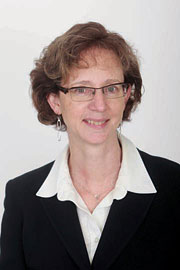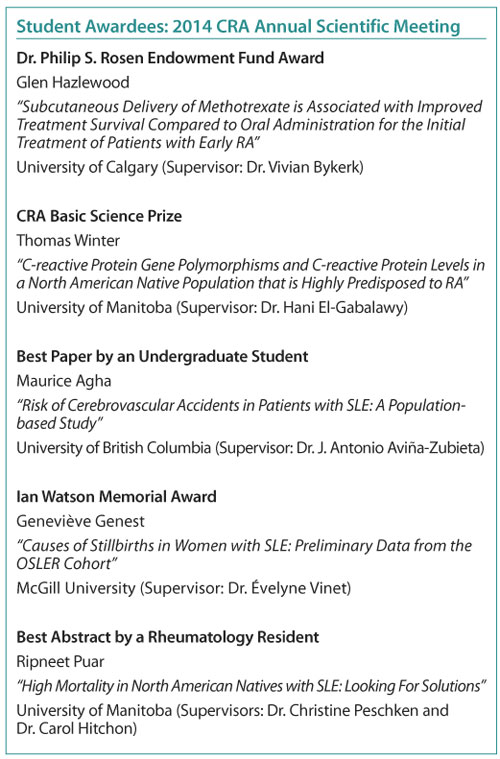Summer 2014 (Volume 24, Number 2)
The CRA’s 2014 Teacher-Educator: Dr. Evelyn Sutton
Download PDF

1. What circumstances propelled you towards teaching? Who were your educational inspirations? Did you anticipate your career trajectory leading in this direction?
I have always loved to share what I enjoy, whether it is a beautiful sunset, a new recipe, or a new experience. So teaching came naturally—I loved learning medicine and sharing it with those who were interested.
I did not anticipate my career—it found me! I did not start out with a plan; after residency I went into private practice but was happy to accept a
part-time appointment with the university. I enjoyed being on the rheumatology consultation service as it gave me a chance to interact with learners and it also provided a break from the routine of the office. As time went on, I was offered opportunities to participate not only in teaching but also administration, which to my surprise I also found rewarding.
2. What have been your greatest challenges and accomplishments in your role as Assistant Dean of Medical School Admissions at Dalhousie?
The reality that the majority of people who apply to medicine will be unhappy with the Admissions Committee’s decisions fueled my desire to provide practical feedback to unsuccessful applicants. The previous system of full file review did nothing to dispel myths that surrounded what made for a successful application. Although files were intensely scrutinized, the outcome was based on the Admissions Committee voting on to either accept or reject each application. Feedback to unsuccessful applicants would be vague at best.
Replacing the traditional interview of one faculty member and one medical student per applicant with multiple, timed interviews (multi-mini interviews) allowed for component and anonymized scoring. Now, unsuccessful applicants are provided with their component scores and how they compared with those who were successful; this allows them to make a more informed decision on whether to reapply and, if they do, which parts of their application need to be improved to be competitive. I do not think it eases the disappointment which unsuccessful applicants experience, but it does provide them with feedback that should allow them to strengthen their application should they choose to reapply.
In addition to providing objective feedback to unsuccessful applicants, the component scoring will allow longitudinal studies of what makes or does not make a successful medical student and doctor, and future Admissions Deans will be able to revise these criteria on the basis of that evidence.
3. You were instrumental in initiating a one-month elective in medical education for all residents at Dalhousie. This program recently celebrated its tenth anniversary and has been recognized by the Royal College as an innovation of excellence. How did this initiative come about? What was the prime motivator to push for this initiative?
The idea for a one-month elective in medical education came out of a discussion with a renowned educator, Dr. Karen Mann, whom I met while serving on our medical school’s undergraduate curriculum committee. I certainly cannot take full credit. We had noted that many residents were interested in teaching, but were uncertain whether a Masters in Medical Education was the correct career path for them. This resulted in further discussions and the recruitment of Dr. Blye Frank, then Department Head of Medical Education. The three of us worked together to develop the curriculum for the elective. The real work of implementing it was and continues to be done by Dr. Mann and her colleagues in medical education.
4. Your teaching endeavours have been recognized nationally, with your receipt of the Faculty of Medicine Community of Scholars Award for Excellence in Medical Education and Canadian Association of Medical Education (CAME) Certificate of Merit. What is your proudest achievement as an educator?
Without a doubt, to be recognized by the CRA as Teacher-Educator of the year is the most special. It was a magical week to be congratulated warmly by former and current students and colleagues. Hearing the quotes Dr. Taylor provided in her introductory speech reminded me of the film “It’s a Wonderful Life”. On the one hand I wondered if she was sure they were talking about me, on the other hand I recognized who must have authored some of the comments, and I was deeply moved. Truly, this is my lifetime achievement award!
5. You have held various academic roles with the Faculty of Medicine at Dalhousie University in undergraduate, postgraduate and continuing medical education. How do you feel your involvement has shaped the trajectories of your students?
I do not know that my involvement has shaped their trajectories, but I have been privileged to meet many wonderful undergraduate and graduate students. My goal has always been to help students, if needed, to discover their own path to successful career fulfillment. I have been delighted when some chose rheumatology, but equally happy when a student matched to their first choice in Canadian Resident Matching Service (CARMS), whatever the discipline.
6. What type of teaching environment do you think fosters the best learning potential? Why?
Any environment where both the learner and teacher are engaged
(i.e., one wants to learn and the other is keen to transfer knowledge) is the best environment. It can be in a lecture hall, at the bedside, or even as one walks between buildings en route to the next consult. As a teacher it is critical to know one’s audience: where are they on their knowledge acquisition journey? Do they know what they need to know, or do I need to give them some cases to open up their knowledge blind spots? I find that most people in medicine—from student to practicing physician of many years—are keen to learn what they believe to be relevant to them. As the teacher, once you know that, the next step is to determine what teaching style works best for them and try to adapt one’s teaching style to reflect that.
7. What are the current challenges for those teaching in the university environment?
Time is now and always has been the biggest challenge: balancing patient care with administration, research, home life, and teaching! Learning how to incorporate teachable moments into even the busiest clinics is something I am mindful of daily.
8. What would your advice be to some of your younger colleagues who are interested in enhancing their teaching skills in rheumatology?
I would strongly encourage them to take advantage of the courses their own universities no doubt offer, and to take advantage of workshops that help refine communication skills or even improve one’s own clinical skills not just confined to rheumatology. I have learned most from observing other skilled clinicians and how they teach—Dalhousie’s Department of Medicine runs “Teach the Teachers” workshops where we learn from each other. Observing a skilled neurologist teach the cerebellar exam, for example, improved not only my exam but I was able to transfer some of his techniques into my own teaching. The key to the cerebellar exam is the same as MSK exam: you have to refresh your knowledge of anatomy. Once you have that, you do not need to memorize, but can do the exams by applying logic.
9. In 2004 you authored a textbook entitled Musculoskeletal Examination: A Primer for Medical Students; this work has since become an instrumental reference tool for medical students and residents within Canada and beyond. Tell us about compiling this work, the importance of standardized examination techniques, and your experience with having this work available to students.
I wrote it to assist medical students who complained to me they were overwhelmed by the musculoskeletal (MSK) exam and that the recommended textbooks were bewildering because of all the named tests for each joint. I wanted to show them that competency could be achieved in the MSK exam by focusing on what was similar between regional exams, not by memorizing named tests for each joint. It really started with written text that I would hand my students weekly during their MSK block of their undergraduate curriculum. After a few years I added the pictures.
My experience has been that all levels of learners really appreciated the simplified approach. Although designed with the undergraduate medical student in mind, internal medicine residents and even rheumatology trainees expressed their appreciation for it. The text was not meant to be the definitive book on MSK examination, but rather to provide a solid base from which those interested in pursuing more detailed examination could build.
10. What is something you have lost that you have never found, or were tremendously relieved when you did find it?
I lost the only memento I had of my paternal grandmother, who I am named after. It was the diamond engagement ring my grandfather gave to her, and it was the ring his father had given
to his mother. My grandparents were married for 67 years, and it still hurts that I lost this family heirloom.
11. Three things you think will become obsolete in 10 years:
Cheque books, open-ended retirement for physicians, and privacy.
12. If you could compete in the Olympics, which event would you participate in?
I would have loved to have the athleticism to compete in any Olympic sport (!) but if I could pick any I would have chosen the 1,500 meters—long enough that strategy is required and not so short that in a blink it is over.
13. What do you love most about living in Halifax?
I love being near the ocean, being able to walk to work, restaurants, and theatres and concerts. It has the advantages of a larger city but with the conveniences of a small town.
14. You are handed a plane ticket to anywhere in the world. Where are you going?
I have never been to New Zealand and would love to go hiking there.
15. What was your first paid job? How long did it last?
Apart from babysitting from the age of 12 (for 50¢/hour), my first “real job” was during he summer between my Grade 10 and 11 years as playground leader for the muni-cipal Parks and Recreation Department. Instead of babysitting neighbour’s children in their homes, I essentially babysat the neighbourhood. The park had a wading pool so someone always had to be in attendance. I did that for one summer—that was enough! I worked every summer through high school and university; jobs ranged from waitressing (the worst job), working on the railroad as a station operator (the best), to being a lab assistant.
Evelyn Sutton, MD, FRCPC
Professor of Medicine and Medical Education,
Dalhousie University
Director of Arthritis Center of Nova Scotia
Halifax, Nova Scotia

|



